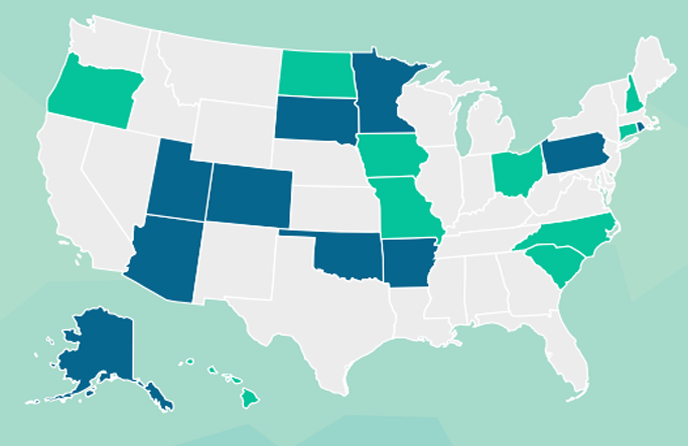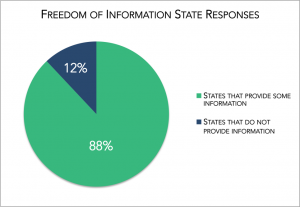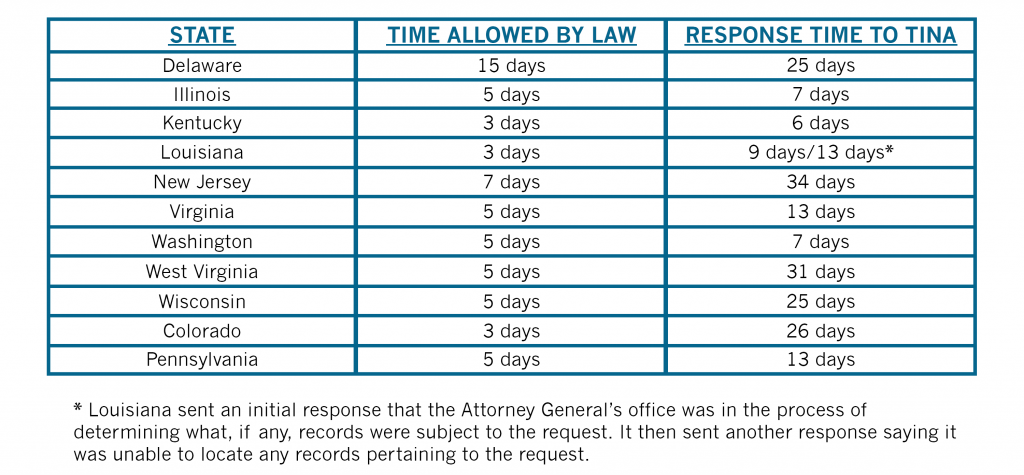SUNSHINE REPORT: STATE-BY-STATE ACCESS TO CONSUMER COMPLAINTS
From TruthInAdvertising.org November 17, 2015
As a nonprofit focused on educating and empowering consumers to protect themselves from false and deceptive advertising, truthinadvertising.org (TINA.org) routinely files requests under the Freedom of Information Act (FOIA) with state and federal officials for consumer complaints lodged against companies it is investigating. These complaints provide valuable information about experiences consumers have had with a business. While consumer complaints filed with key federal consumer protection agencies are available to the public, states differ drastically as to whether and how they disclose these same types of complaints.
Importance of Complaints
Consumers who take the time to file a complaint with state officials can provide valuable information on how a business operates in practice. While consumers may turn to online reviews and ratings sites to evaluate a business, those sources can be murky. Fake reviews are a troublesome issue and some businesses are trying to tamp down negative reviews with terms and conditions that impose gag orders and fines. Thus, complaints filed with state officials become an important resource for consumers. States that lock complaints behind closed doors are limiting access to useful information about experiences fellow consumers have had with a company.

Click on the image to expand for infographic
Equally important is the ability to keep government officials accountable. States that keep consumer records from the public are severely limiting the public’s ability to monitor whether government officials are doing enough to protect them from unscrupulous enterprises by taking action against a company.
In order to gauge the level of access consumers have in different states to these important records, TINA.org launched a Freedom of Information (FOIA) project, sending pubic records requests to all 50 states and analyzing the pertinent public records laws.
Methodology
Specifically, TINA.org sent requests to attorneys general offices in all 50 states for consumer complaints against Wake Up Now. The requests asked for copies of all consumer complaints filed against the company with any of the consumers’ personal identifying information — such as names, phone numbers, and addresses — redacted. The requests indicated the time frame that the states had to respond as outlined in their open records laws. For a sample FOIA letter click here.
TINA.org also sent letters to additional state consumer protection departments if the departments were separate from the attorney general office in that state or if a state official upon receipt of the FOI request indicated that there was another department where the request should be sent. TINA.org sent the letters in a variety of ways, including via email, online form, fax or through the mail – it all depended on the process outlined by the state. TINA.org did not appeal any of the decisions other than a denial in Utah.
RELATED: Does Your State Reveal Consumer Complaints?
If a state replied that it did not find any records “responsive” to TINA.org’s request, TINA.org categorized those states as ones that would disclose the complaints if there were any after it reviewed the laws in those states.
(Note: States differ greatly on their FOIA procedures and ease of filing requests. To some degree, the responses TINA.org received may have been dependent upon the state officials who reviewed the requests. The time frame for the response was also dependent on getting requests to the appropriate official.)
Results: Best and Worst States
The good news is that more than 85 percent of states disclose some amount of information regarding consumer complaints they receive about businesses, ranging from posting the information online to just providing the number of complaints filed. But 12 percent refuse to release any information with regard to consumer complaints.

The three most open states are Hawaii, New Hampshire, and Oregon, all of which provide an online searchable database for consumers. South Carolina’s Department of Consumer Affairs is also commendable; it posts a buyer’s beware list of businesses that have not responded to complaints filed against it or businesses that did not provide the promised resolution.
However, consumers seeking complaint information from Alaska, Minnesota, Oklahoma, Pennsylvania, Arizona, and Rhode Island, face a drastically different response. These states denied access to the complaints.
In between the givers and the deniers are numerous states that disclosed some amount of information. Arkansas and Tennessee will only let residents of the state review its public documents. (Despite the law, Tennessee’s Department of Consumer Affairs did respond that no complaints had been filed against the company, even though TINA.org is not a resident of the state.) Utah only discloses complaints that meet certain criteria. And although the offices of the attorney general in California and Nevada would not disclose consumer complaints, other consumer protection departments in these states did indicate they would release the complaints received by their offices. Click here for a list of states best to worst.
Timely vs. Untimely Responses
In analyzing the FOIA responses, TINA.org also reviewed how long it took states to respond to its requests. Six states — Connecticut, Iowa, Missouri, North Carolina, North Dakota, and Ohio– responded within the same day as the request was sent and most responded in the time allotted by state statutes. But 11 states failed to comply with the time frame required by their open records laws.

Challenging a Denial
In the states that denied access to consumer complaints there are arguments to be made for permitting disclosure.
Many of the states that did not release the complaints based their withholding of them on the premise that consumer complaints should be classified as “investigatory files” — despite the fact that many of the laws in these states do not specifically list consumer complaints as exempt from disclosure. As such, it is a premise ripe for challenging. In fact, only three states specifically list consumer complaints as nonpublic records: Alaska, Pennsylvania, and Minnesota.
In addition, several state have discretionary language that would allow the attorney general to disclose the complaints. For example, in Oklahoma, state statues provide that the Attorney General may keep its litigation files and investigatory records confidential but it doesn’t say the office has to do that. (In fact, another section of the Oklahoma statute seems to be in conflict with deeming consumer complaints as part of exempt investigative files. This section states: “Access to records which under the Oklahoma Open Records Act, would be otherwise available for public inspection and copying, shall not be denied because a public body or public official is using or has taken possession of such records for investigatory purposes or has placed the records in a litigation file.”)
Moreover, many states – including at least three that denied access – Alaska, Arizona and Pennsylvania — have what is known as balancing language in their statutes. This, in essence, allows public officials to release records exempt from disclosure if it serves the public interest.
More to Do
While an overwhelming majority of states will allow consumers to view complaints filed with state officials, there is more work to be done. TINA.org would like to see all the 50 states make consumer complaints filed with state officials easily and readily available in online databases to anyone who is researching a company. Short of that, states should streamline the process for requesting complaints by making requests easier to submit and by outlining their FOIA process in easy-to-understand terms that are readily available and simple for consumers to locate. Consumers in states that keep them from public view should push their lawmakers to clarify state open records statues and specifically classify consumer complaints as public records of vital interest to all.
---30---
ILind: Hawaii Gets A Gold Star For Consumer Complaints
ILind: How does Hawaii rank on disclosure of consumer complaints?
DCCA: Business Complaint History Searches